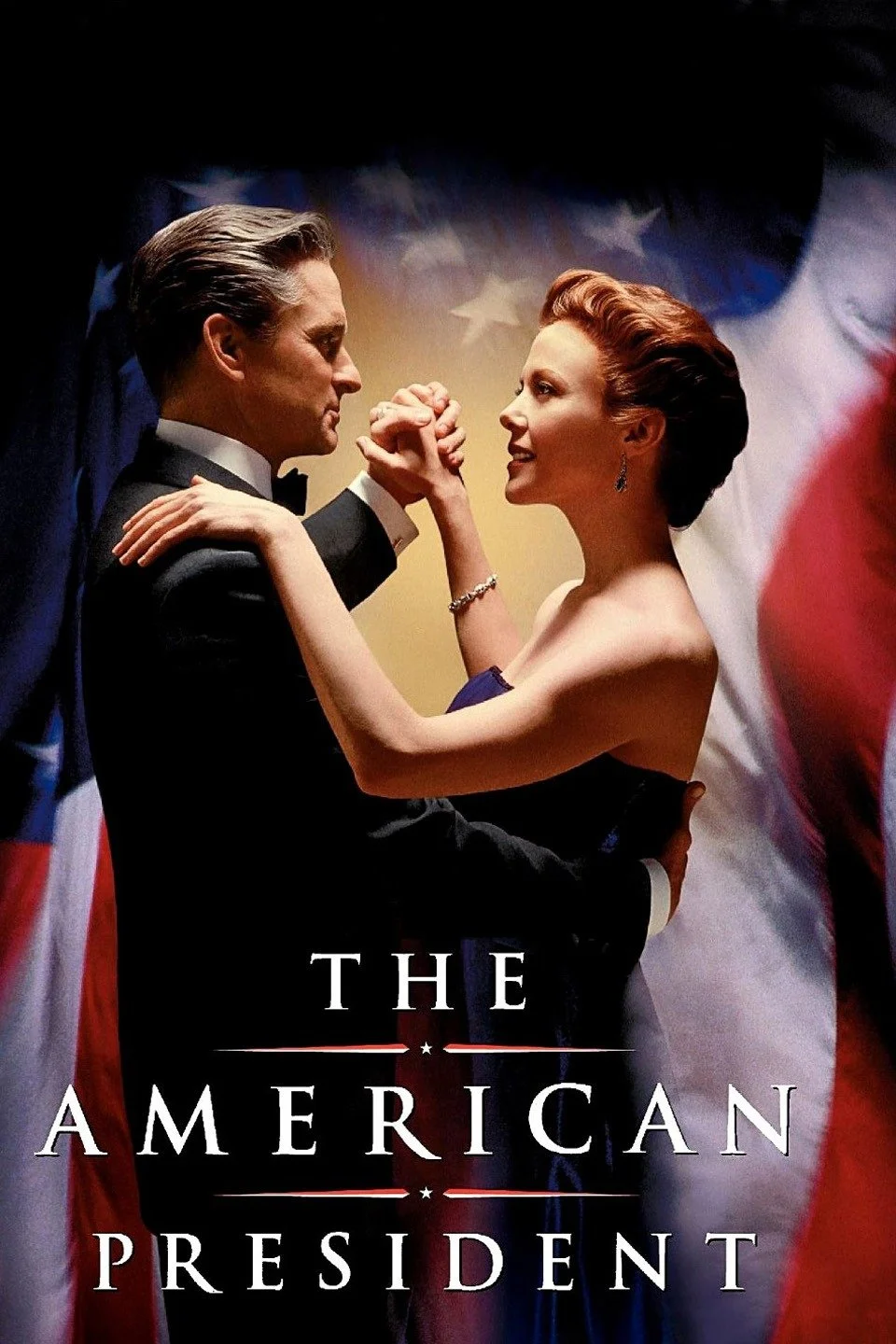6. The American President (1995)
Queuing up The American President in late-summer 2018 is a masochistic act of the highest order, but here we are. The resulting film - written by Aaron Sorkin (who would go on to hone his self-righteous indignation with such series as a The West Wing and The Newsroom) and directed by Rob Reiner (of When Harry Met Sally fame) - shows what happens when liberal Hollywood elites focus their lenses on the emotions of governing and the politics of love.
There is no rocky, somewhat stilted beginning for The American President. Instead, the film throws the audience right in, greeted at the door by a concerned speechwriter on a Monday morning midway through President Andrew Shepherd’s (Michael Douglas) first term, and key narrative exposition is deftly given during a signature Sorkin “walk and talk” followed by the president’s daily briefing.
For my exposition, let’s begin with the president’s political agenda. Bolstered by a 63% job approval rating, President Shepherd’s primary goal is pushing through a crime bill with bipartisan lack of support - progressives in his party condemn its exclusion of handgun restrictions and conservatives because, well, duh. Meanwhile, the climate change lobby is calling on the president to support a notable reduction in fossil fuel emissions over the next ten years. When he informs the Global Defense Council that such strict regulations would never make it beyond the House of Representatives, the head of the GDC brings in a hired gun to lobby on the environment’s behalf. Sydney Ellen Wade (Annette Benning) and the equally unattached American President inevitably fall for each other in the personal arena while at odds professionally.
On the domestic front, things are only slightly less complicated. Widowed shortly before the campaign, Shepherd is now raising a twelve-year-old daughter entirely on his own. His sympathetic situation saved him from engaging in nasty character debates in the past, but his Republican challenger (Senate Minority Leader Bob Rumsen, played by Richard Dreyfuss) is less inclined to go easy during the re-election campaign. Not to mention, this new relationship, unfair as it may seem, opens him up to attacks on his principles, patriotism and family values. After all, this movie was made in 1995 when Bill Clinton was in office defending his own personal indiscretions and norms of political behavior were not yet a thing of the past.
Sorkin’s writing is, of course, smarter, sharper, and more nuanced than most rom-com scripts. But rather than thumbing his nose or subverting the genre, he embraces the classic rom-com “meet cute” trope and sets his characters at odds in their initial interaction. As a smitten Shepherd explains to his chief of staff, A.J. McInerney (Martin Sheen), “She threatened me, I patronized her. We didn’t have anything to eat, but I thought there was a connection.” As President, people treat Shepherd with a reverence and respect the office once commanded. His best friend (said chief of staff) refuses to call him “Andy” even when they are alone, opting for “Mr. President” no matter the time of day, casualness of the setting, or intimacy of the conversation. In Sydney’s razzing - her honesty and gentle sarcasm - he glimpses the potential for someone to look past his title and see him simply for the man he is.
When warning her as to the risks of mixing business with pleasure, Leo Solomon, Sydney’s boss at the GDC, notes, “Politics is perception.” Leo is confirming that which most women already know: The truth of the matter is often of far less import than how it appears. Not surprisingly, his proclamation places the burden of politics and perception on Sydney by making it clear that a relationship with the President will only serve to undermine her professionally and personally. This rhetoric surrounding multiple interpretations (or more likely misinterpretations) is present throughout Sorkin’s script. When Sydney meets Shepherd’s daughter for casual meatloaf night: “[My dad] told me to tell you he’s on the phone with his dentist. He wants you to think he’s a regular guy.” When Shepherd optimistically explains their predicament: “There was a moment last night when you were with me, not the President, and I know what a huge step that was for you.” When the press discovers that Sydney slept over at the White House: “I think the important thing is not to look like we’re panicking.” When Andy justifies his C- grade in Women’s Studies: “That class wasn’t about what I thought it was about.” When he questions A.J.’s ambitions: “Is the view pretty good from the cheap seats? It occurs to me that in 25 years I’ve never seen your name on a ballot.” And when they strategize over Sydney’s: “No, the GDC’s political director didn’t tell us anything. Sydney Wade told her boyfriend and her boyfriend’s best friend that she had a lousy day.” Politicians are especially adept at making reality align with their message, though we all have our ways of spinning the truth and, more frequently, lying to ourselves.
There are, of course, bigger hurdles to climb, but in the beginning, the greatest issue plaguing their burgeoning relationship is Sydney’s inability to see Shepherd as anything other than the President. And it’s not a matter of perception. He is, by definition (though important to note it’s a political distinction), the most powerful man in the world, under constant scrutiny, trying to do his job while also campaigning to keep it. Obvious interpretations of abuses of power aside, Sydney Ellen Wade holds her own with the President, largely due to her self-possession and Benning’s performance. Sydney is grounded, level-headed, well-spoken and whip smart. She’s a powerful political operative and she knows her worth: “How much do you make?” “More than you do, Mr. President!” After making a deal with the President, she splits her time between whipping votes at the office and romantic candlelit dinners. Her costumes consist of work clothes and modest, tailored suits, which match his attire and aesthetically indicate her ability to meet him on his level, despite the White House being the single greatest home court advantage in the modern world. Looking back, it is refreshingly wonderful to see a rom-com heroine who prioritized her career and is really fucking good at her job. So good, in fact, the President has to sabotage her legislative agenda in order to push through his own.
Between Sorkin’s mastery of language and structure and Reiner’s understanding of the romantic comedy, The American President does not have to prioritize one agenda over the other. It can have it both ways, showcasing a command of narrative tension while expertly weaving between the sobering setting of the situation room and the sheer silliness of a man whose credit cards are packed up in storage in Wisconsin trying to send a woman flowers. And unlike some Presidents, Shepherd is surrounded by the best people: Martin Sheen as his chief of staff, Michael J. Fox as a senior domestic policy advisor and legislative liaison, David Paymer as a polling specialist, and Anna Deavere Smith as his press secretary. (Sheen would later get his name on a ballot and assume the the top job in Sorkin’s television reprisal.)
No matter how many times I’ve seen it (and at one point during my youth it was committed to memory), President Shepherd’s final speech to the White House press corps never fails to bring tears to my eyes. I used to cry because of its meaningful message conveying pride in this country and an unstinting hope for what it can represent; and now it leaves me devastated by all the ways in which we’ve failed to live up to such promise. Through the lens of this current political climate, The American President is the ultimate form of cinematic escapism in its representation of a world where an idealistic principled Democrat occupies the White House, and the biggest scandal plaguing his administration is the will they or won’t they of it all. Politics is perception, and for now at least, this movie is but a fantasy.




